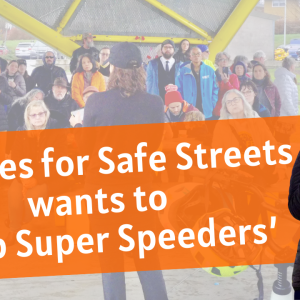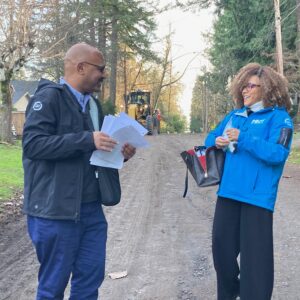
Bike Gallery owner Jay Graves at the
National Bike Summit last March.
(Photo: Jonathan Maus)
After his stirring presentation about how bicycles can solve many of the world’s problems at this year’s National Bike Summit, I wondered whether or not Trek President John Burke was “the Al Gore of the bicycle industry.”
Now, he has followed up his talk with action.
At the recent Trek World dealer event in Madison, Wisconsin Burke unveiled his “One World, Two Wheels” initiative. In front of 1,000 plus Trek dealers from all over the country, Burke joined six other bike advocates (including Bike Gallery owner Jay Graves and League of American Bicyclists Director Andy Clarke).

According to an article on BicycleRetailer.com, Burke’s initiative will,
“…provide leadership and commitment…and will donate $10 for every full-suspension bike sold to IMBA, for a minimum of $600,000 over the next three years. Trek also will donate $1 per helmet to Bicycle Friendly Communities, for a minimum of $1 million over the next three years.”
Burke also set out an ambitious goal: to increase U.S. trips by bike from 1 percent to 5 percent by Trek World 2017.







Thanks for reading.
BikePortland has served this community with independent community journalism since 2005. We rely on subscriptions from readers like you to survive. Your financial support is vital in keeping this valuable resource alive and well.
Please subscribe today to strengthen and expand our work.
It is great to hear that Trek will support IMBA in such a way. Mountain biking is at risk in many areas across the country and here in the Pacific Northwest.
Way to go!
Cool. ^_^ It\’s great to see that large bike companies (I\’m sure others will follow) are getting involved in advocacy.
That\’s awesome! On the subject of advocacy, I wonder what Portland area advocates (off road or on) would do with say 1 million dollars.
But ahem…how about all those road bikes sales trek makes?
I would hope that his excellent effort also helps advocate for facilities that his other bikes ride on (and most mountain bikes do and to from the trails). I do understand that there may not be a single IMBA for the road.
And Jay keep up the good work behind the scenes! (Or perhaps pick up John\’s slack for road bikes in Vancouver/Portland.)
Sounds like someone\’s got a surplus of now unwanted full-suspension bikes.
I really hate to be cynical, but… Here I go.
Trek\’s estimated and anticipated sales this year are close to $70 million dollars (Dunn & Bradstreet).
While every effort to promote the use of bicycles is good and while I particularly appreciate the vision of \”One world, two wheels\”…
We\’re talking about a minimum commitment of $1.6 million over the next three years, or 533K per year. I\’m not hugely impressed by Trek\’s \”ambitious\” initiative. Especially since the support is focused on full-suspension bikes and leaves out Road, hybrid, comfort, leisure and everything else.
In sum, \”Thanks, Trek! But you can do better. An even stronger commitment and leadership role will have a much greater positive effect in promoting \”One World, Two Wheels.\”
-Todd
Now we should go talk to Giant, Schwinn, Marin, etc.
All IMBA does is lobby for trail access. If all trail access everywhere went away today, it would mean fewer cars on the road hauling Trek dual suspension MTB\’s to parks.
Great headline, disappointing story.
Hmmm.. I don\’t think just pushing IMBA is a good move for getting a broad range of people on bikes. I\’d much perfer to fund the League of American Bicyclist. While I really enjoy riding, I\’m not a huge mountain bike fan. Mtn. bikes can be fun, but they also can cause a lot of damage in our pristine forests.
Todd,
Do some research. Trek is greatly involved in Bikes Belong, which covers the road, comfort, hybrid and leisure bikes. They are also involved as a major sponsor of World Bicycle Relief. Not to mention sponsoring the Trek 100 which this year helped raise $1.3 million for childhood cancer.
While you may not like Trek they do more than most to help promote cycling as well as many other good causes.
http://www.bikesbelong.org
http://www.worldbicyclerelief.org
http://www.maccfund.org
http://www.oneworld-twowheels.com
Would you prefer they did nothing?
Any advocacy at any level is a good thing.
Damage to the forest is exactly the reason to support IMBA. Their trail building initiative is focused on training people to build sustainable trails.
I have worked with them on trails for the last 3 years. Every trail is well thought out with regard to damage and erosion control. None of the trails I\’ve worked on have required more than superficial maintenance, mostly related to cutting back undergrowth and less about rebuilding trails.
The trail building techniques used are based on those developed by the WPA in the 30\’s. There are trails throughout the US built back then that have survived with minimal maintenance because of these building techniques.
I\’ve also hiked and biked in the Mt Hood National Fores, Forest Park, and Powell Butte, and seen what happens when trails are poorly built. You end up doing more maintenance than riding. Fall line trails erode and wash out. Water diverters and rip rap are required to keep the trail viable.
While these trails are strictly for leisure activities, building them correctly to have a minimal impact on the environment is better than what has happened in the past, when the untrained go ahead and bushwhack their way through the forest.